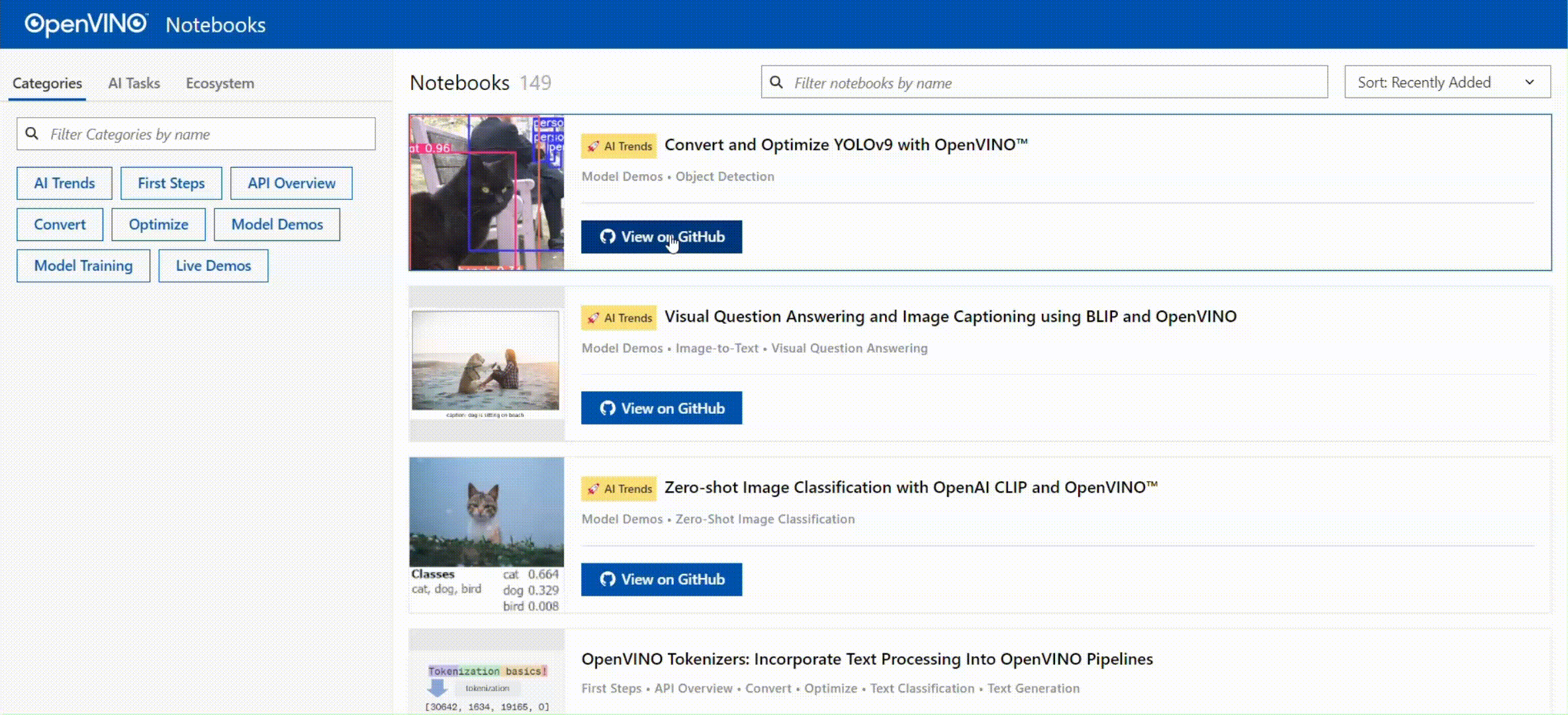English | [简体中文](README_cn.md) <h1>📚 OpenVINO™ Notebooks</h1> [](https://github.com/openvinotoolkit/openvino_notebooks/blob/main/LICENSE) [](https://github.com/openvinotoolkit/openvino_notebooks/actions/workflows/treon_precommit.yml?query=event%3Apush) [](https://github.com/openvinotoolkit/openvino_notebooks/actions/workflows/docker.yml?query=event%3Apush) > **Note:** This branch of the notebooks repository is deprecated and will be maintained until September 30, 2024. The new branch offers a better user experience and simplifies maintenance due to significant refactoring and a more preferred folder name structure. Please use the local [`README.md`](https://github.com/openvinotoolkit/openvino_notebooks/blob/latest/notebooks/README.md) file and [OpenVINO™ Notebooks at GitHub Pages](https://openvinotoolkit.github.io/openvino_notebooks/) to navigate through the content. A collection of ready-to-run Jupyter notebooks for learning and experimenting with the OpenVINO™ Toolkit. The notebooks provide an introduction to OpenVINO basics and teach developers how to leverage our API for optimized deep learning inference. 🚀 Checkout interactive GitHub pages application for navigation between OpenVINO™ Notebooks content: [OpenVINO™ Notebooks at GitHub Pages](https://openvinotoolkit.github.io/openvino_notebooks/) [](https://openvinotoolkit.github.io/openvino_notebooks/) []() ## Table of Contents - [Table of Contents](#table-of-contents) - [📝 Installation Guide](#-installation-guide) - [🚀 Getting Started](#-getting-started) - [⚙️ System Requirements](#️-system-requirements) - [💻 Run the Notebooks](#-run-the-notebooks) - [To Launch a Single Notebook](#to-launch-a-single-notebook) - [To Launch all Notebooks](#to-launch-all-notebooks) - [🧹 Cleaning Up](#-cleaning-up) - [⚠️ Troubleshooting](#️-troubleshooting) - [🧑💻 Contributors](#-contributors) - [❓ FAQ](#-faq) []() <div id='-installation-guide'/> ## 📝 Installation Guide OpenVINO Notebooks require Python and Git. To get started, select the guide for your operating system or environment: | [Windows](https://github.com/openvinotoolkit/openvino_notebooks/wiki/Windows) | [Ubuntu](https://github.com/openvinotoolkit/openvino_notebooks/wiki/Ubuntu) | [macOS](https://github.com/openvinotoolkit/openvino_notebooks/wiki/macOS) | [Red Hat](https://github.com/openvinotoolkit/openvino_notebooks/wiki/Red-Hat-and-CentOS) | [CentOS](https://github.com/openvinotoolkit/openvino_notebooks/wiki/Red-Hat-and-CentOS) | [Azure ML](https://github.com/openvinotoolkit/openvino_notebooks/wiki/AzureML) | [Docker](https://github.com/openvinotoolkit/openvino_notebooks/wiki/Docker) | [Amazon SageMaker](https://github.com/openvinotoolkit/openvino_notebooks/wiki/SageMaker) | | ----------------------------------------------------------------------------- | --------------------------------------------------------------------------- | ------------------------------------------------------------------------- | ---------------------------------------------------------------------------------------- | --------------------------------------------------------------------------------------- | ------------------------------------------------------------------------------ | --------------------------------------------------------------------------- | ---------------------------------------------------------------------------------------- | []() <div id='-getting-started'/> ## 🚀 Getting Started Explore Jupyter notebooks using this [page](https://openvinotoolkit.github.io/openvino_notebooks/), select one related to your needs or give them all a try. Good Luck! **NOTE: The main branch of this repository was updated to support the new OpenVINO 2024.0 release.** To upgrade to the new release version, please run `pip install --upgrade -r requirements.txt` in your `openvino_env` virtual environment. If you need to install for the first time, see the [Installation Guide](#-installation-guide) section below. If you wish to use the previous release version of OpenVINO, please checkout the [2023.3 branch](https://github.com/openvinotoolkit/openvino_notebooks/tree/2023.3). If you wish to use the previous Long Term Support (LTS) version of OpenVINO check out the [2022.3 branch](https://github.com/openvinotoolkit/openvino_notebooks/tree/2022.3). If you need help, please start a GitHub [Discussion](https://github.com/openvinotoolkit/openvino_notebooks/discussions). If you run into issues, please check the [troubleshooting section](#-troubleshooting), [FAQs](#-faq) or start a GitHub [discussion](https://github.com/openvinotoolkit/openvino_notebooks/discussions). Notebooks with  and  buttons can be run without installing anything. [Binder](https://mybinder.org/) and [Google Colab](https://colab.research.google.com/) are free online services with limited resources. For the best performance, please follow the [Installation Guide](#-installation-guide) and run the notebooks locally. []() <div id='-system-requirements'></div> ## ⚙️ System Requirements The notebooks run almost anywhere — your laptop, a cloud VM, or even a Docker container. The table below lists the supported operating systems and Python versions. | Supported Operating System | [Python Version (64-bit)](https://www.python.org/) | | :--------------------------------------------------------- |:---------------------------------------------------| | Ubuntu 20.04 LTS, 64-bit | 3.8 - 3.11 | | Ubuntu 22.04 LTS, 64-bit | 3.8 - 3.11 | | Red Hat Enterprise Linux 8, 64-bit | 3.8 - 3.11 | | CentOS 7, 64-bit | 3.8 - 3.11 | | macOS 10.15.x versions or higher | 3.8 - 3.11 | | Windows 10, 64-bit Pro, Enterprise or Education editions | 3.8 - 3.11 | | Windows Server 2016 or higher | 3.8 - 3.11 | [](#) <div id='-run-the-notebooks'></div> ## 💻 Run the Notebooks ### To Launch a Single Notebook If you wish to launch only one notebook, like the Monodepth notebook, run the command below. ```bash jupyter 201-vision-monodepth.ipynb ``` ### To Launch all Notebooks ```bash jupyter lab notebooks ``` In your browser, select a notebook from the file browser in Jupyter Lab using the left sidebar. Each tutorial is located in a subdirectory within the `notebooks` directory. <img src="https://user-images.githubusercontent.com/15709723/120527271-006fd200-c38f-11eb-9935-2d36d50bab9f.gif"> []() <div id='-cleaning-up'></div> ## 🧹 Cleaning Up <div id='-shut-down-jupyter-kernel' markdown="1"> 1. Shut Down Jupyter Kernel To end your Jupyter session, press `Ctrl-c`. This will prompt you to `Shutdown this Jupyter server (y/[n])?` enter `y` and hit `Enter`. </div> <div id='-deactivate-virtual-environment' markdown="1"> 2. Deactivate Virtual Environment To deactivate your virtualenv, simply run `deactivate` from the terminal window where you activated `openvino_env`. This will deactivate your environment. To reactivate your environment, run `source openvino_env/bin/activate` on Linux or `openvino_env\Scripts\activate` on Windows, then type `jupyter lab` or `jupyter notebook` to launch the notebooks again. </div> <div id='-delete-virtual-environment' markdown="1"> 3. Delete Virtual Environment _(Optional)_ To remove your virtual environment, simply delete the `openvino_env` directory: </div> <div id='-on-linux-and-macos' markdown="1"> - On Linux and macOS: ```bash rm -rf openvino_env ``` </div> <div id='-on-windows' markdown="1"> - On Windows: ```bash rmdir /s openvino_env ``` </div> <div id='-remove-openvino-env-kernel' markdown="1"> - Remove `openvino_env` Kernel from Jupyter ```bash jupyter kernelspec remove openvino_env ``` </div> []() <div id='-troubleshooting'></div> ## ⚠️ Troubleshooting If these tips do not solve your problem, please open a [discussion topic](https://github.com/openvinotoolkit/openvino_notebooks/discussions) or create an [issue](https://github.com/openvinotoolkit/openvino_notebooks/issues)! - To check some common installation problems, run `python check_install.py`. This script is located in the openvino_notebooks directory. Please run it after activating the `openvino_env` virtual environment. - If you get an `ImportError`, double-check that you installed the Jupyter kernel. If necessary, choose the `openvino_env` kernel from the _Kernel->Change Kernel_ menu in Jupyter Lab or Jupyter Notebook. - If OpenVINO is installed globally, do not run installation commands in a terminal where `setupvars.bat` or `setupvars.sh` are sourced. - For Windows installation, it is recommended to use _Command Prompt (`cmd.exe`)_, not _PowerShell_. [](#-contributors) <div id='-contributors'></div> ## 🧑💻 Contributors <a href="https://github.com/openvinotoolkit/openvino_notebooks/graphs/contributors"> <img src="https://contrib.rocks/image?repo=openvinotoolkit/openvino_notebooks" /> </a> Made with [`contrib.rocks`](https://contrib.rocks). []() <div id='-faq'></div> ## ❓ FAQ * [Which devices does OpenVINO support?](https://docs.openvino.ai/2024/openvino-workflow/running-inference/inference-devices-and-modes.html) * [What is the first CPU generation you support with OpenVINO?](https://www.intel.com/content/www/us/en/developer/tools/openvino-toolkit/system-requirements.html) * [Are there any success stories about deploying real-world solutions with OpenVINO?](https://www.intel.com/content/www/us/en/internet-of-things/ai-in-production/success-stories.html) --- \* Other names and brands may be claimed as the property of others.